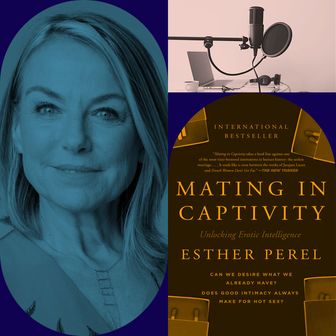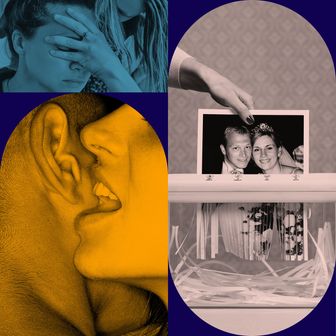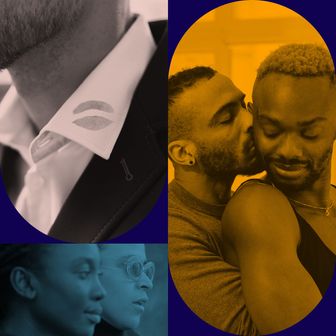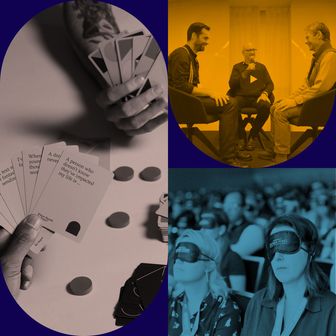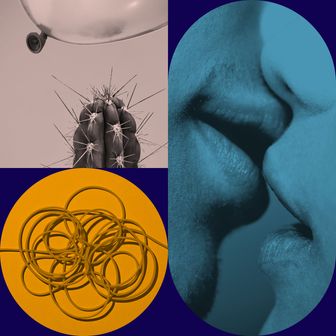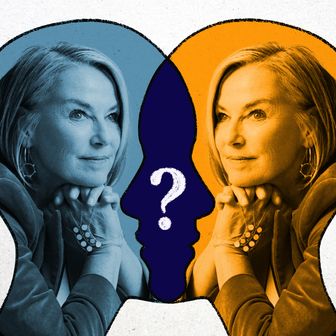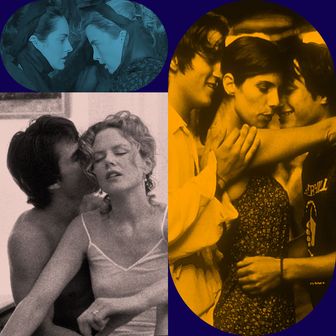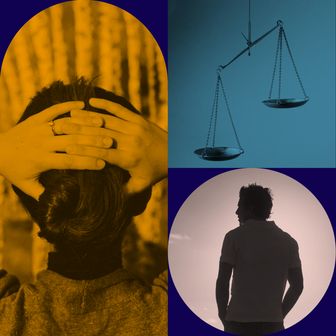
Technically, when it comes to episodes of Where Should We Begin?, Esther Perel “doesn’t play favorites and doesn’t have a No. 1.” But after five seasons and 50-odd recorded sessions with couples, a few episodes — and the characters, plotlines, and surprise moments that populate them — stand out. With the podcast joining the Vox Media Podcast Network this month (and Perel becoming part of the New York family), we asked her for ten to start with.
“Twice Married, to Each Other”
“This was the first session I did in person after the pandemic. I was so eager to actually work with the body again that I asked the couple — who were fighting and arguing, and it was just really escalating — if they would lay down flat on the floor and continue their argument. They looked at me, and I said, ‘You know, there’s something that changes when you try to fight horizontally looking up at the ceiling.’ It shifted the whole dynamic between them. We were excited to bring this physical dimension back into our work. You can’t do some of this when you work over Zoom; you need to be in the room.” Listen here.
“Speak to Me in French”
“This couple had been together for 17 years. There was a sexlessness that was so encrusted in the relationship, and when people come in stuck like that, you cannot just sit down and start doing small edits. You have to go in with a sledgehammer. During the session, I asked him, ‘Is there another character inside of you that is not as inhibited, that can be the seducer that you’d like to be?’ And he tells me, ‘Jean Claude.’ So I decided to continue the session in French, and I blindfolded them. Once we were in play mode, she responded very differently to Jean Claude. She just listened to him — even though his French wasn’t so great — but it was exactly what was needed for them to have a glimpse of how they could be different to each other.” Listen here.
“In This Relationship, What Is the ‘I’ and What Is the ‘We’?”
“A challenge for any couple is the developmental stage in the relationship where you create space for each individuality to reemerge. At first, the couple is what holds you together. Once a couple is established, how do you make that room for two entities, two individuals, to have their autonomy inside the relationship? This couple had helped each other emigrate from their homes in the Dominican Republic, establish themselves in New York, and develop careers. They created a unit and really saved each other. But at some point, you need space for the individuals — that’s the ‘we’ and the ‘I.’” Listen here.
“Do You Want Me to Watch the Kids While You Go Out With Other Guys?”
“She says, ‘My sexuality has never belonged to me. My sexuality belonged to my Indian culture, to the Catholic church, to my family, and then to my husband. And therefore, my sexuality feels mine for the first time when it’s not with my husband, in the context of marriage.’ He basically says, ‘What am I doing in the meantime? Do you want me to just do the dishes while you go experience your sexuality elsewhere?’ They had a beautiful relationship, and it was a very interesting situation, so I wanted to meet them again and see where the story went. They were the first couple we ever brought back in a ‘Where Are They Now’ episode.” Listen here.
“My Orgasm Is Not Just for Me”
“She asked if she could come early to prepare the room. She brought in various Sudanese rituals for when you’re going to have a difficult conversation — you prepare the mood, you bring certain flowers, certain incense, and bring in the ancestors. She’s the first woman in her entire family to not go through female genital mutilation, but at the same time, her clitoris is numb. It hasn’t been damaged, but she can’t experience pleasure. We created a whole ritual around talking about it.” Listen here.
“I Don’t Mean to Be Mean But …”
“This was an attempt to work with a couple that really fights. And I lost it — like, I started to scold them. I know when I lose my neutrality and I’ve become part of the system rather than helping the system. She was upset with him for a host of very valid reasons. And she said she didn’t want to belittle him or shame him, but that’s exactly what she did with every sentence. And it wasn’t just her; from everything she said, he would take the one thing that he could disagree with and start to argue with that. I felt the same ‘grrrr’ inside of me, and I found out later they actually did find it very helpful.” Listen here.
“On Again/Off Again”
“This couple had been on and off for 20 years. Years apart, years together, years apart. I remember so vividly how she described her challenges as a Black woman. She wants to feel that she can have a family, that she can be married, and that she can have a man — and a relationship — that doesn’t feed into a negative narrative about Black people and sustainability in relationships.” Listen here.
“The Chronic Philanderer”
“This was a situation where I was looking for compassion for someone who is doing things that are quite dislikeable. At the same time, I found out that it’s been very painful for him not to be the biological father of his daughters, and how they use that when they’re mad at him. I’ve often said that you don’t necessarily have to feel guilty for having had an affair, but you definitely have to feel guilty for hurting the person that you’re with. That remorse and responsibility is a different piece. And he didn’t have much of either.” Listen here.
“100 Conversations With You in My Head”
“This is also a story of an infidelity on the man’s side, but there’s a whole other dynamic going on. She’s a sex educator who finds out at her annual gynecological appointment that she has an STI. It’s like, Really? That’s how she finds out? She’s experiencing such raw pain. And at the same time, she knows that he’s not inherently hurtful or a bad person. You understand his loneliness, sadness, and his desire to connect with her. It doesn’t justify anything, but you could feel the palpable love between these two people.” Listen here.
“What Would It Take for You to Come Out?”
“This is a story of two Black American women where one of them is in this totally hidden relationship. It has all the elements of an affair, but it’s actually a closeted relationship for one of them. Religion, family, and internalized homophobia play big roles. The other person longs to not just be somebody’s secret, which has a humiliating element to it. It’s not the purpose — the reason is that one person is deeply conflicted. But the other person personalizes it in a very painful way. They would finish having sex and be delighted, and then one of the women would say she didn’t enjoy it, because the experience and the narrative were completely incongruous.” Listen here.
More From Esther Perel's Universe
- Esther Perel’s Advice for Giving Advice (and Hosting Dinner Parties)
- The Complete Esther Perel Immersion Course
- Which Episode of Where Should We Begin? Should You Listen to Right Now?


